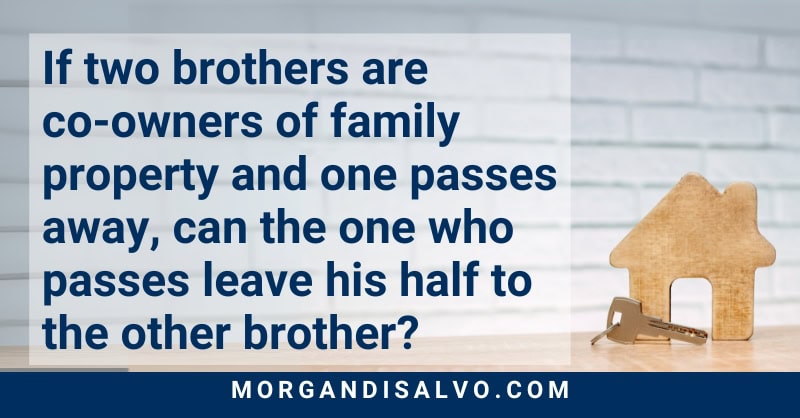Question: If two brothers are co-owners of family property and are both on the legal deed to the property, what happens when one of them dies? If the one who passes has a last Will and testament that leaves his half to another brother, will it be honored?
Loraine’s Answer: The answer to whether a Will is honored depends greatly on whether the Will is valid and whether, if anyone tries to challenge the Will, the challenge will succeed. Whether a Will is necessary to transfer one owner’s interest in a parcel of real estate to another owner depends on how the deed under which the title to the real estate is held is written.
In Georgia, a deed held by multiple owners can be held as either “tenants in common” or as “joint tenants.” If the deed names the owners and does NOT contain any language that clearly says a right of survivorship or a joint tenancy is intended, then the owners hold the property as tenants in common; if the deed specifically says that the owners hold the property as “joint tenants,” “with rights of survivorship,” or something very similar, then they hold it as joint tenants.
This matters because if owners hold a property as joint tenants, a deceased owner’s interest passes automatically to the surviving owner and the deceased owner’s Will has no control over the deceased owner’s interest in the property. In most cases, however, siblings who own property will hold it as tenants in common. In that case, if one sibling dies, that sibling’s interest in the property is controlled by that sibling’s Will (assuming he did not own it through any kind of trust or other entity that could affect it).
If the property deed or title does not have language indicating that it is owned as joint tenants with rights of survivorship, , you must then determine how the deceased owner’s Will is worded and if it is valid. For a Will to be valid in Georgia, it must have been signed by the deceased person and at least two disinterested witnesses under certain circumstances, and the deceased person had to have been in his right mind when the Will was signed.
To become effective and result in property transfers, the Will has to be admitted to probate in the appropriate probate court after the person’s death. If a valid Will is admitted to probate, then it will control the property, and if the Will says that the deceased person’s interest in the property goes to his brother, that’s what should happen.
The probate process is where a potential challenge could come in. If the deceased brother was married, or had children, then the spouse and the children will have rights as heirs. They could try to challenge the Will as invalid. A surviving spouse or a surviving minor child could also try to make a claim for a year’s support from the estate and try to take the deceased owner’s interest in the property that way. These attempts may or may not succeed. If the deceased person was not married and had no spouse or descendants, then the person’s parents may be his heirs and could try to challenge the Will. However, if the deceased person had no surviving spouse, descendant, or parent, then the person’s siblings are next in line as heirs. In a case where the brother who survives is the deceased person’s only sibling, then the only person who could challenge the Will as an heir may also be the beneficiary.
To summarize: If the brothers own the property as joint tenants with rights of survivorship, which is possible but may be unlikely, then the surviving brother should have automatically received the deceased brother’s interest in the property at the deceased brother’s death, no matter what the deceased owner’s Will might say. However, if the brothers own the property as tenants in common, if the deceased brother has a valid Will, if the Will is admitted to probate and there is no successful challenge or year’s support claim made, and if the Will says that the surviving brother/other property owner gets the deceased brother’s share, then that’s what is likely to actually happen. However, if the brothers own the property as tenants in common, if the deceased owner has a valid Will that is admitted to probate, and if the deceased owner left his interest in the property to a different brother, then that different brother is going to end up owning the deceased owner’s share of the property.
Key Estate Planning Takeaway: How a deceased owner’s interest in a parcel of real estate is transferred to another owner depends on how the deed under which the title to the real estate is held is written. If the property deed or title does not have language indicating that it is owned by the owners as joint tenants with rights of survivorship, then you must determine how the deceased owner’s Will is worded and if it is valid, if the deceased owner has a Will.
This “Q&A with Loraine” blog series is inspired by answers from Morgan + DiSalvo Partner Loraine DiSalvo to actual user questions posted by individuals on www.avvo.com. This blog is a more in-depth response than can be given on their site under their character limits for answers. To view the original question and Loraine’s original response, click here.




